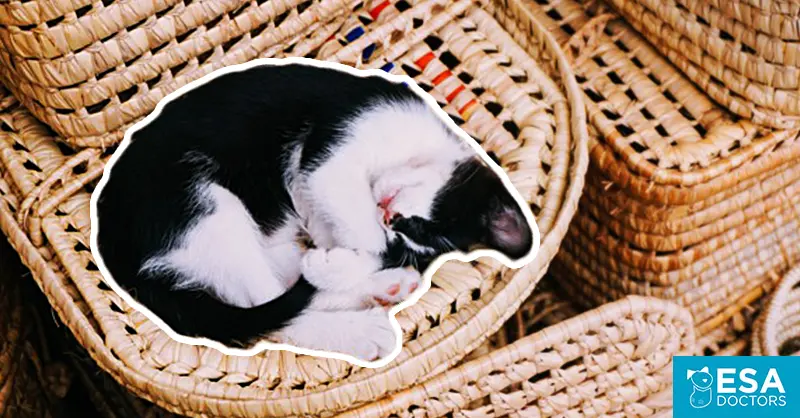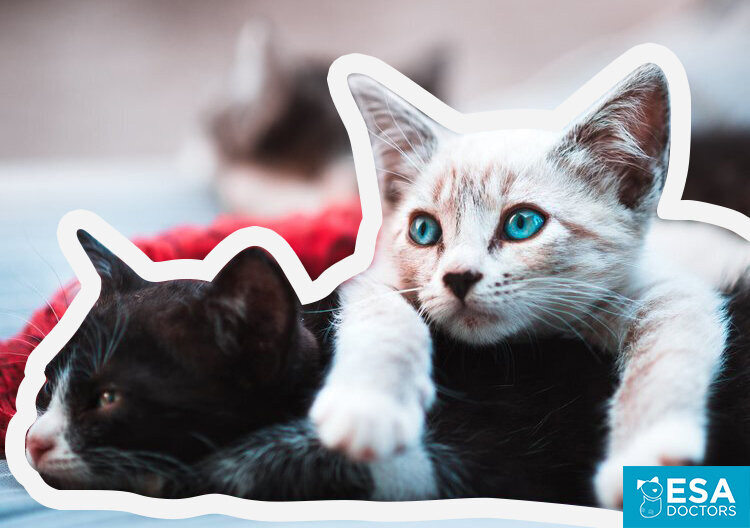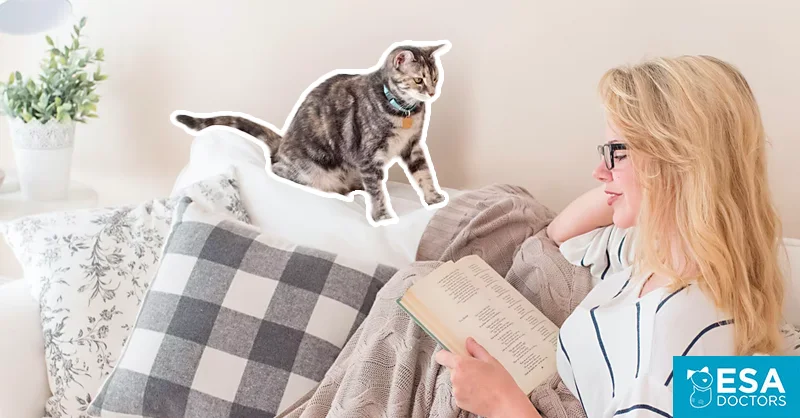Yes, cats can be emotional support animals because they can improve mental health, and they’re legally recognized for their role as support animals under federal and state laws.
The presence of a cat in the household, as well as interactions with a cat, have been shown to reduce measurable negative moods like anxiety and depression.
And because ESAs have housing rights, you don’t have to live in fear that your landlord will evict your emotional support cat. ESA owners also enjoy perks like the ability to live in no-pet buildings without having to pay any fees or deposits.
In this article, we’ll explain why cats can be emotional support animals.
How Cats Are Eligible as Emotional Support Animals
An emotional support cat is more than just a pet: they play a vital role in helping their owners maintain mental and emotional stability.
One study showed that cat owners scored better on measurements for health, depression, anxiety, and sleep disturbance than people without any pets. Another study showed that cat owners enjoyed a higher quality of life than non-pet owners. Because of their benefits for people with mental health issues, cats are explicitly recognized as valid emotional support animals under Fair Housing guidelines.
Yes, Cats Are Covered by the Fair Housing Act

The FHA, or Fair Housing Act, allows you to live with your emotional support cat, even in “no-pets” apartments and condos. The FHA also protects ESA owners from unlawful discriminatory acts by landlords, including homeowner associations (HOA), co-ops, and rental apartments.
A landlord can’t excuse themself from accepting an ESA because they’re afraid the cat will tear up the carpets and curtains or cause other damage. A mere concern about potential allergies or the odor from a litter box is also not a valid excuse.
Even if the housing provider has a written policy explicitly banning cats, they still have to make an exception for legitimate emotional support cats. Landlords have faced expensive lawsuits for not correctly welcoming emotional support cats.
Emotional support cats are also exempt from pet fees, application fees, and deposits. A landlord cannot discriminate against your cat because it is a certain size or breed. You don’t need to register an emotional support cat, but you will need an ESA letter from a licensed healthcare professional.
How can I get an ESA letter for my cat?
Click here to qualify for your ESA letter from a licensed health professional.
Tips for your future emotional support cats
There’s no right or wrong answer when adopting an emotional support cat, but there are some considerations like breeds that exhibit specific traits and going with feral vs. shelter born. Below you’ll find seven tips we’ve discovered in our 10 years of experience assisting people just like you with their ESAs.
Tip #1 – Familiarize yourself with cat breeds
Just like people, every cat has a unique personality, and just like dogs, some breeds have people-oriented tendencies, making them the go-to for ESAs.
Here are 7 cat breeds you may want to consider:
- Ragdolls are known for their calm and affectionate nature and tendency to form strong bonds with their owners, which offers a strong feeling of companionship.
- Maine Coone cats have a friendly, social, and empathetic nature, making them perfect for people who want a cat that plays and offers loyal companionship.
- Siamese cats can be vocal and communicative and bond deeply with their humans, offering affection and reducing feelings of loneliness.
- Scottish Folds are recognizable by their adorable folded ears. They are calm, cuddly, and enjoy being close to their owners.
- Burmese cats are people-oriented and incredibly affectionate. They thrive on interaction and provide constant companionship and love.
- Persian cats are known for their long, luxurious coats and sweet disposition. Persians are calm and gentle, making them great stress-relievers.
In your search for a cat, don’t forget to neglect shelter cats. They come in various personalities, allowing potential owners to find the perfect match. Shelter cats, once they adapt, can be even more affectionate, loyal, and supportive than any purebred cat.
Tip #2 – Feral cats are difficult to rely on for emotional support
It is always wonderful to rescue street cats, but when it comes to having a cat as an ESA, that feral fellow may not work. Feral cats are sometimes wild, nervous, and afraid of humans, causing more stress or anxiety rather than alleviating the mental health issues someone is facing.
These cats can be “tamed,” but it takes time, patience, and the right person. Training a cat can be a therapeutic journey for the owner, fostering a deep sense of achievement and emotional bonding that reduces stress and enhances empathy.
This transformative process not only benefits the cat but can also serve as a source of therapeutic healing for the caregiver, offering mutual comfort and companionship.
Tip #3 – Bond with your cat
To bond with a cat and build a deep connection, start by providing a safe space and letting the cat approach you on its terms. Engage in play and offer treats to create positive associations. Speak softly and consider gentle grooming to enhance trust and comfort. With patience and consistent care, this approach fosters a strong bond of mutual trust and affection, enriching both your lives.
Try paying attention to the cat’s instinctive behaviors. Is it a pouncer, a chaser, a bird watcher? By knowing your cat’s natural tendencies, you can introduce toys and activities that match its interests and needs.
Tip #4 – Consider Special Needs Cats
Don’t overlook special needs cats, including those with physical disabilities, chronic health issues, or older cats. Adopting a special needs cat offers a unique opportunity to form a deep, meaningful bond through the extra care they require. This experience can enrich your life with enhanced compassion, a sense of purpose, and the joy of overcoming challenges together.
Special needs cats often demonstrate remarkable resilience, teaching valuable lessons in adaptability and perseverance. By choosing to adopt one, you not only save a life but also gain a loyal and affectionate companion, making a profound impact on both your lives.
Tip# 5 – Spay or neuter is your safest bet
Consider whether spaying or neutering your cat is advisable. Males left intact tend to urine mark and can be more aggressive. Females left unaltered will regularly come into heat and try to escape outdoors to be bred. These extra worries may be troublesome if you already suffer from emotional issues.
Cats are awesome!
If your cat provides comfort for your depression, anxiety, or other mental illness, you’re certainly not alone. Emotional support cats are the second most popular type of emotional support animal after dogs.
Follow the link below to get started on your path to making your cat an official ESA. You will be happy you did, and so will your furry feline friend.
Qualify for your ESA cat letter today
100% Money back guarantee if you do not qualify









We have feral cats in the parking lot that we care for and the association wants us to stop feeding them. We are all emotionally distraught over this. Can they possibly be ESA animals living outside?
Unfortunately feral cats cannot qualify as emotional support animals. An emotional support animal is a pet that is kept in the home by the owner in their residence.
I have 2 cats that I would like to register as emotional support animals. Is this a possibility??
You are allowed to have more than one ESA as long as the healthcare professional determines you have a need for each of them. Please see this article for more details: https://esadoctors.com/more-than-one-emotional-support-animal/
I am currently looking to adopt a cat to register as an ESA and I fell in love with a cat with special needs. Would this bar him from being registered?
You can have an ESA cat that has special needs. Special needs animals make for wonderful companions. You also do not need to register ESAs. Please see this link for info on the ESA process: https://esadoctors.com/esa-letter/
Just a question about the rules ESA owners have to follow to gain the full service that their ESA is to provide for them. Someone at university has an ESA cat in the dorms but constantly leaves it in their room with their roommate and is never there to bond with it. The only person it interacts with besides the owner is the roommate, this is either the second or third cat they’ve had for an ESA, would this cause the cat to pick up the behavior of the roommate rather than the owner? I’ve noticed that when it is left in the room alone it tends to cry a lot and sounds almost like it’s destroying things in their room or attacking/play fighting with the roommate more and more, and if the door is ever opened the cat seems to bolt almost as if it is trying to escape, is this normal? I believe this cat and the one(s) before it are just from the shelter so there was never a deep bond to begin with once it was registered as an ESA. Is there anything I can do, I’m really starting to worry for the sake of the cat because I don’t think this is a proper living situation for it to be in.
ESAs can leave their animals at home for short periods of time, just as pet owners can. ESAs must always of course be kept in humane conditions and cared for properly. If you feel any animal is being neglected you can report the situation to your building manager.
hello, I am moving to the US soon, from France, and I don’t know how to get my at ESA approved in the US. is a letter from my French psychologist enough?
You will need a letter from a healthcare professional licensed in the state you are moving to. If you need our help, please see this link for a guide to our process: https://esadoctors.com/esa-letter/
Hi, my therapist office got a letter saying they can no longer give a letter for support. They wrote a letter to my family doctor to see if he will do it, The Dr said no,
I suffer from PDSD, have seizures/strokes and heart attacks. My 2 cats are everything to me to keep me sain.
We can help connect you to a licensed professional that specializes in ESAs, just click on this link to get started: https://esadoctors.com/esa-questionnaire/
no an RN can NOT write an ESA letter
Under the latest HUD guidelines from 2020, nurses were specifically named as one type of licensed professional that is allowed to write an ESA letter. You can read more about HUD’s rules here: https://esadoctors.com/hud-housing-rules-emotional-support-animals/
I got an ESA letter but it says its for a dog. I have a cat, would this affect my landlords acceptance of my cat?
The ESA letter should be specific about the type of ESA you are requesting accommodation for.
I have severe anxiety and depression. Would I qualify?
A licensed healthcare professional would have to make that determination. If you need a professional to assess you for an ESA, you can get started at this link: https://esadoctors.com/esa-questionnaire/
Can a LLMSW write an ESA letter?
Licensed social workers can write ESA letters.